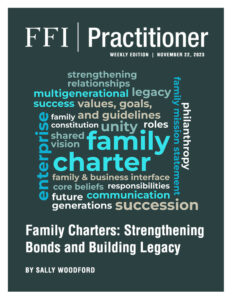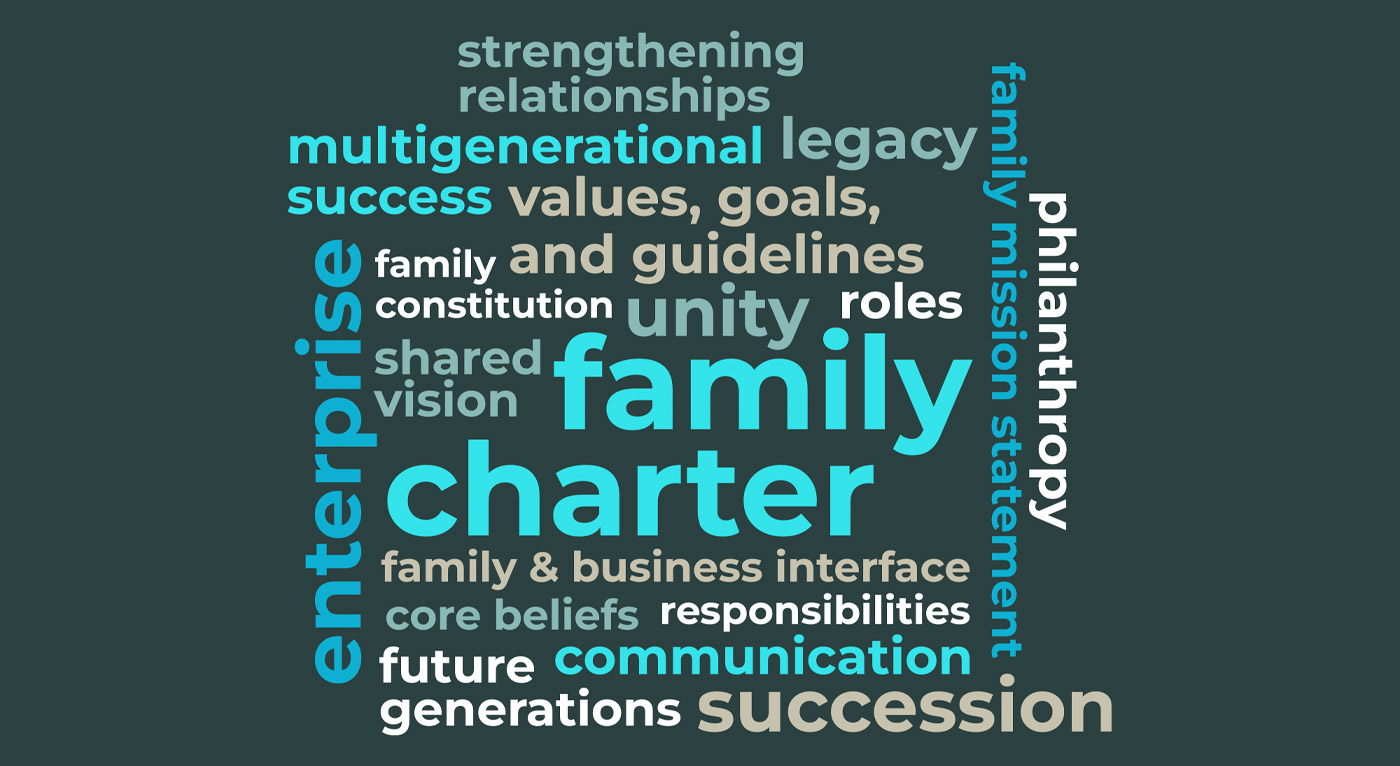
View this edition in our enhanced digital edition format with supporting visual insight and information.
Thank you to this week’s contributor, Sally Woodford, for her article exploring the many ways a family charter can help provide family enterprise clients with a foundation to strengthen family unity and sustain multigenerational success.
In today’s fast-paced world, where families often find themselves scattered geographically and caught up in their individual pursuits, it’s becoming increasingly important to prioritize family unity and establish a shared vision for the future of the enterprise. One effective way for practitioners to help their clients achieve these goals is through the creation of a family charter, also referred to as a family constitution.
Although not a legally binding document, a family charter sets out essential principles for family governance structures and practices. It outlines the values, goals, and guidelines that govern a family’s interactions, responsibilities, and decision-making processes, and it can serve as the main basis of the long-term family strategy. This article will explore the significance of family charters and how they can help strengthen family bonds and build a lasting legacy, as well as the important role of the family enterprise advisor in this process.
Enter the Family Enterprise Advisor
Tailoring the approach to the needs of each family, the family enterprise advisor’s role is crucial in facilitating the process and bringing generations together while providing independent advice. Building trusted relationships with the clients is key, as is a profound understanding of the family’s dynamics and values. A practitioner’s best qualities can include an approach based on human relations, tact, and psychology. Asking the right questions can go a long way. I have found the more dialogue, the better, as open discussions and understanding the family values and vision help to identify and inspire the clients’ long-term goals.
The advisor must also either have sufficient expertise regarding each topic contained within the family charter or be willing to collaborate with other advisors who possess this knowledge to guide the family through design discussions and help the client understand the implications of their choices. For larger family systems, interdisciplinary advisor teams may be helpful to manage the more complex processes and dynamics.
Defining the Family’s Purpose and Values
The process of developing a family charter often begins by defining the purpose and values that serve as the foundation for the family unit. These statements articulate the shared vision and core beliefs that the family collectively holds dear. The charter provides a mission statement, unique to each family, with clear aspirations set out for the current and next generations. With the support and experienced help of advisors, the process of developing the family mission statement allows family members to engage in meaningful discussions, reflect on their core values, and establish a common ground upon which they can build strong relationships.
Encouraging Open Communication
One of the key benefits of a family charter is the encouragement of open communication. By setting guidelines for how family members should communicate with one another, a charter aims to foster an environment of trust, respect, and understanding. It provides a process for addressing conflicts, resolving differences, and promoting healthy dialogue. The charter may also create the structure for regular family meetings to discuss important matters, ensuring that everyone’s voice is heard and valued, especially through different generations.
Defining Roles and Responsibilities
The family charter also contains a section outlining the roles and responsibilities of each family member, providing a solid basis for family governance. Among the first steps that practitioners should take when working with clients on a family charter is to define who is considered a family member. This is vital in establishing the allocation of power and responsibilities. It helps to distribute tasks and obligations fairly and to ensure that everyone contributes to the overall well-being of the family. By clearly defining expectations and decision-making protocols, the charter reduces ambiguity and potential conflicts. It promotes accountability and often teaches younger generations the importance of taking responsibility for their actions. It may include policies regarding education, investments, conflict resolution. Topics such as prenuptial agreements and other requirements for family members may be included as well.
Succession and Management of Business Ownership
In cases where there is a family-owned operating business, the family charter may also include provisions regarding the management of business ownership, including any restrictions and incentives that can be put in place to keep ownership within the family. Practitioners may suggest a section that references and summarizes key provisions of the shareholder agreements, dividend policies, and voting rights, including rules that govern share purchases and sale by family members. However, keep in mind that because the family charter is not a legally binding document, legally enforceable rights and restrictions should be contained in other legal ownerships agreements.
Essential questions also include reflecting on the guiding principles of leadership succession and family member employment. Should all family members be allowed to be involved in the business? If so, which criteria should determine their involvement, and to what point? On what basis will their performance and capacity to run the business be evaluated?
Specific committees may be appointed to run the different branches, for example those regarding investment and philanthropy.
Philanthropy
Philanthropic activities may provide useful means to encourage family cohesion and to strengthen the affiliation to a family’s values and vision, but they also prompt many questions. Is there an existing structure already in place? Which causes does the family want to support? Does the foundation have a mission statement? How can impact and success be measured? How will other family members be involved? Do they even want to be fully engaged in the same projects? Which structures need to be in place? What does the decision-making process look like? For a practitioner, the importance of dialogue, reflection, and discussion is central in defining governance and goals.
Planning for the Future
The family charter is a living document that should serve as a roadmap for the future. It enables families to set long-term goals concerning education, a sense of identity, aspirations, financial planning, and philanthropic initiatives. While a business plan might cover the next one to five years, a family charter could span 100 years (with opportunities for the family to review and update it along the way), creating a long-term vision via strategic planning about the ways that the family’s wealth may support the family legacy.
By aligning the family’s values and objectives, a charter provides a framework for decision-making and ensures that everyone is working towards a common purpose. It encourages members to think beyond their immediate needs and contributes to the development of a sustainable legacy. It is particularly beneficial in cases where discretionary powers of judgment might need to be exercised.
Once established, charters are potent tools for fostering unity, strengthening relationships, and building a lasting legacy. They provide a solid foundation for communication, define roles and responsibilities, preserve family traditions, and guide future planning. In working with client families to draw up family charters, practitioners guide them in taking steps to ensure that their values, aspirations, and visions are passed on to future generations. A charter is a wise investment in the well-being of the family, promoting legacy, harmony, and unity amidst the challenges of the modern world.
About the Contributor

Sally Woodford is a trusted advisor to UHNW families, delivering expertise and service in intergenerational family dynamics, family office design, governance structures, estate planning, private collection and project management, and philanthropy. Prior to her consulting work, Sally held key leadership positions in private family offices. She holds a STEP certificate in International Trust Management and is an honors graduate of Oxford University and of University College London. Sally can be reached at sallywoodfordj@gmail.com.

View this edition in our enhanced digital edition format with supporting visual insight and information.





